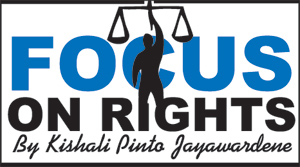Columns
The twin evils of militarisation and dictatorship
View(s):President Mahinda Rajapaksa’s announcement this week that ‘I am no dictator’ (see Daily Mirror, August 21st 2013) may gladden the hearts of his eager sycophants but will do little to placate fears of concerned Sri Lankans that the country’s democratic institutions are being gradually dismantled.
Establishing a new ministry under the purview of the military?
Just two days after this announcement, we were privileged (as taken in its most ironic sense) to hear of a new Ministry of Law and Order to operate under the President and empowered to supervise the Department of the Police which was formerly under the direct control of the Ministry of Defence. Manned by a former Army Chief of Staff as its Secretary, the establishing of yet another ministry drawing upon sparse public funds at a time when even the statutory dues of state employees are not being paid, was supposed to be in pursuance of the recommendations of the Lessons Learnt and Reconciliation Commission (LLRC).

Quite apart from the wastage of public funds which indeed is the least of our worries in this particular context, is this really what the LLRC recommended? Let us look at what the Commission actually said for the sake of greater clarity. Its 2011 report advised the delinking of the civilian Department of the Police from the ‘institutions dealing with the armed forces which are responsible for the security of the State’ (at p374 of the LLRC report).
The Commissioners recorded their ‘alarm’ at blatant violations of the right to life and noted ‘strong public concerns that criminal investigations, law enforcement and the police administration have been adversely affected due to political interference resulting in an erosion of confidence in the criminal justice system’ (at p339 of the report).
Taking Presidential assurances with a pinch of salt
Indeed, it must be said that no critic of this Government could have put it more abrasively than this. Even during the period that the Commissioners sat, the situation was so bad that its members, who were by no means human rights crusaders, had little choice but to put the matter so bluntly. Two years later, there has only been a sharp deterioration of that status quo as evidenced most horrifically by Weliweriya where the army was brutally employed against villagers protesting for clean water resulting in the official toll of the deaths of three innocent bystanders. This was only a logical consequence of what went on in the preceding years.
Fundamentally, the LLRC recommended restoring the civilian role of the Department of the Police. Surely the appointment of a former Army Chief of Staff to head a new ministry is not the most appropriate way of conforming to the LLRC’s suggestions?
So when the President of this country says defiantly that he is no dictator and then proceeds to announce the creation of a new ministry with its Secretary being a former military man, thus immediately heightening the ongoing militarization of Sri Lanka’s public institutions, we may be forgiven for responding with more than a proverbial pinch of salt.
Basic freedoms not granted through magnanimity of government
The outright skepticism that greets such announcements therefore is not propelled by the aim of ridiculing each and every action that this Government takes. Rather, it is due to the fact that this administration has peculiarly distinguished itself, even from its far from saintly predecessors by the total disregard if not bitter contempt that it has shown for the democratic process. It is this which triggers such distrust. The mere creation of a ministry with the title of ‘law and order’ does not address this deficit of public confidence between this Government and its concerned citizens in any way whatsoever. These games would be choicely entertaining if they were not so deadly to Sri Lanka’s democratic future
Meanwhile, certain other aspects of the “I am no dictator’ speech made by President Rajapaksa this week warrant scrutiny. The President appears to believe that the freedoms of speech and expression engaged in by critics against his Government and his Presidency are exercised as a result of the magnanimity of the regime which allows such criticisms to be made. This is by far, a most serious misconception which the President, himself as an opposition politician and once a most vigorous critic of the political establishment, should readily comprehend. The freedom to criticize Governments is not granted as a boon by politicians who may come and go. Instead, this is a freedom as of right and inherent in the very nature of citizenship.
A most perilous truth
Most importantly, as history teaches us, dictatorships are not necessarily characterized by the absence of all critique but rather by the torture, death, disappearance and character assassination of its critics resulting in dissent becoming marginalized and isolated. Unfortunately, these are phenomena that we have now become familiar with in post-war Sri Lanka. The deaths and physical/verbal assaults of newspaper editors, journalists, human rights defenders and opposition politicians form a culture of impunity which frames the explicit subordination of the judiciary and the extreme politicization of the police and the country’s state prosecutors.
Certainly it serves this Government well to allow isolated voices of protest through newspaper columns or on public platforms. However, its ruthless quelling of organized protest and its systematic targeting of critics who fly a little too close to the flame is a matter of documented record as Weliweriya and countless other incidents only bear out too well. This remains a most perilous truth.
comments powered by Disqus
